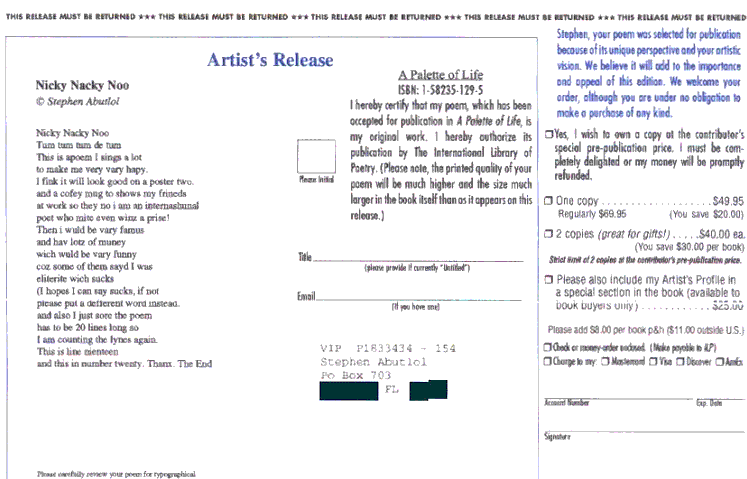Oh, but it does make sense - that is, if you don't read it as separate haikai.
Nach dem Tode
Still lag ich da, vom Vorhang verhüllt;
Die blanke Diele deckten Binsenmatten,
Von Rosmarinduft war der Raum erfüllt,
Durchs Fenstergitter spielten Efeuschatten.
Da fühlt ich ihn sachte zu mir neigen
Er wähnte mich im Schlaf. Ach, arme Kleine,
Hört ich ihn sagen - dann ein tiefes Schweigen -
Er wandte sich - ich wußte, dass er weine.
Er hob mir nicht das Tüchlein vom Gesicht,
Noch faßt' er meine Hand; er rührte nicht
Ans bleiche Laken, an die weichen Kissen:
Einst hatt er mein nicht acht; der Toten galt
Sein Mitgefühl; und süß ists mir zu wissen,
Er ist noch warm, bin ich auch stramm und kalt.
Strange, isn't it? But wait, this isn't a German poet:
After Death
The curtains were drawn, the floor was swept
And strewn with rushes, rosemary and may
Lay thick upon the bed upon which I lay,
Where through the lattice ivy-shadows crept.
He leaned above me, thinking that I slept
And could not hear him; but I heard him say:
'Poor child, poor child:' and as he turned away
Came a deep silence, and I knew he wept.
He did not touch the shroud, or raise the fold
That hid my face, or take my hand in his,
Or ruffle the smooth pillows for my head:
He did not love me, living; but once dead
He pitied me; and very sweet it is
To know he still is warm though I am cold.
But how can a dead person feel and think? Well, you've just read it, haven't you.
I thought the translator outdid the original, which is by Victorian Christina Rossetti, but on closer inspection it is a close call. The German version runs very smoothly, compared to Rossetti's first three lines, where you tend to read
And strewn with rushes, rosemary and may
until you realize that 'may' is part of the fourth line.
Both versions start off very casual, as if it's completely ordinary to hear a deceased describe her surroundings. And of course both are sonnets, although only the original states so right after the title. But Rossetti puts all the lines together, as a running story, the translator restores the standard sonnet form. And the translator bothers not with the repetitiousness of 'poor child, poor child', which may either mean something or nothing at all. It's in the last terzine that lies the difference:
He did not love me, living; but once dead
What? Remorse? No:
He pitied me
So, still nothing then. But the deceased doesn't really care about that:
and very sweet it is
To know he still is warm though I am cold.
That makes you think, doesn't it? Which is, of course, the point. But what happened with our translation? Well, see:
Einst hatt er mein nicht acht; der Toten galt
Sein Mitgefühl; und süß ists mir zu wissen,
Er ist noch warm, bin ich auch stramm und kalt.
That's interesting, because einst hatt er mein nicht acht is even worse than he did not love me, living. (Or is it?) He didn't even notice her! But, in the final two lines the transition is again completely smooth:
und süß ists mir zu wissen,
Er ist noch warm, bin ich auch stramm und kalt.
So, the deceased lingers on to see, if not, after all, in death, some feeling comes forth from this person who apparently ignored her in life. And lo, and behold, it does! And apparently that is enough for the poor woman. This must have been a very powerful love. And yet, not enough for an Englishman to reciprocate. Ah, Victoria...

